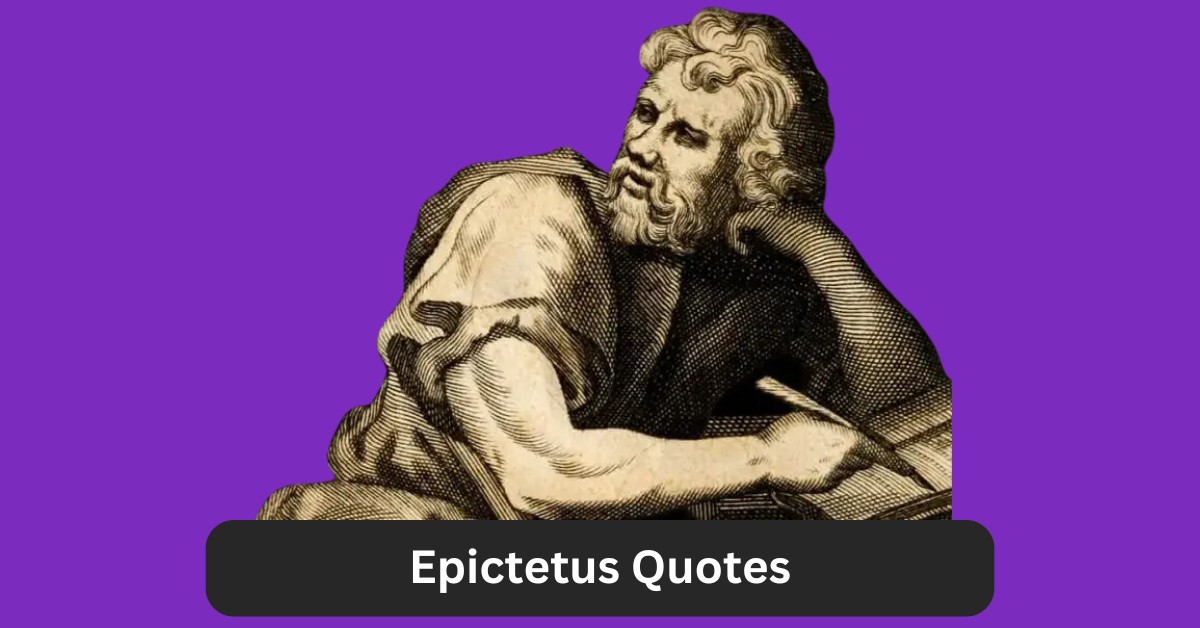Epictetus Quotes offer a profound glimpse into the mind of one of history’s most influential Stoic philosophers. Born a slave and rising to become a revered teacher, his insights resonate with timeless wisdom that speaks to the core of human experience.
His teachings revolve around concepts such as control, freedom, and the nature of life itself ideas that are particularly relevant in our fast-paced modern world filled with uncertainties.
Through these quotes, you’ll discover practical guidance for navigating life’s challenges and fostering resilience amid adversity. If you’re seeking clarity in difficult times or inspiration for personal growth, his words provide both solace and strength.
Who is Epictetus?
He was a prominent Stoic philosopher born around 55 AD in Hierapolis, Phrygia (modern-day Turkey). Originally a slave, his early life was marked by hardship and strict control. His philosophical journey began when he gained his freedom, allowing him to study under Stoic masters in Rome.
His teachings emphasized the idea that while we cannot control external events, we can shape our responses through inner virtue and reason. This fundamental principle of focusing on what lies within our influence resonates deeply with contemporary readers facing life’s unpredictability.

After the banishment of philosophers from Rome in 93 AD by Emperor Domitian, he moved to Nicopolis in Greece where he established a school that became renowned for its rigorous approach to Stoicism.
His ideas were recorded by his student Arrian in works like Discourses and the concise Enchiridion, which continue to influence modern thoughts on personal resilience and ethical living.
He passed away around 135 AD, leaving behind a legacy that encourages individuals across generations to cultivate inner peace amid turmoil.
Stoic Epictetus Quotes
His teachings recognize that our responses to external events define our happiness more than the events themselves.

By adopting this mindset, we empower ourselves to focus on what is within our control, our thoughts and actions, while letting go of concerns over circumstances we cannot change.
- “It’s not what happens to you, but how you react to it that matters.”
- “We have two ears and one mouth so that we can listen twice as much as we speak.”
- “Make the best use of what is in your power, and take the rest as it happens.”
- “First say to yourself what you would be; and then do what you have to do.”
- “When you are offended at any man’s fault, turn to yourself and study your own failings. Then you will forget your anger.”
- “All philosophy lies in two words, sustain and abstain.”
- “The two powers which in my opinion constitute a wise man are those of bearing and forbearing.”
- “People are not disturbed by things, but by the view they take of them.”
- “From this instant on, vow to stop disappointing yourself. Separate yourself from the mob. Decide to be extraordinary and do what you need to do – now.”
- “Any person capable of angering you becomes your master; he can anger you only when you permit yourself to be disturbed by him.”
- “First learn the meaning of what you say, and then speak.”
Epictetus Quotes on Life
His views encapsulate the essence of human experience, emphasizing that our perceptions shape our reality.
External events are beyond our control, he focuses on how we respond to those events. This shift in perspective can transform challenges into opportunities for personal growth and resilience.
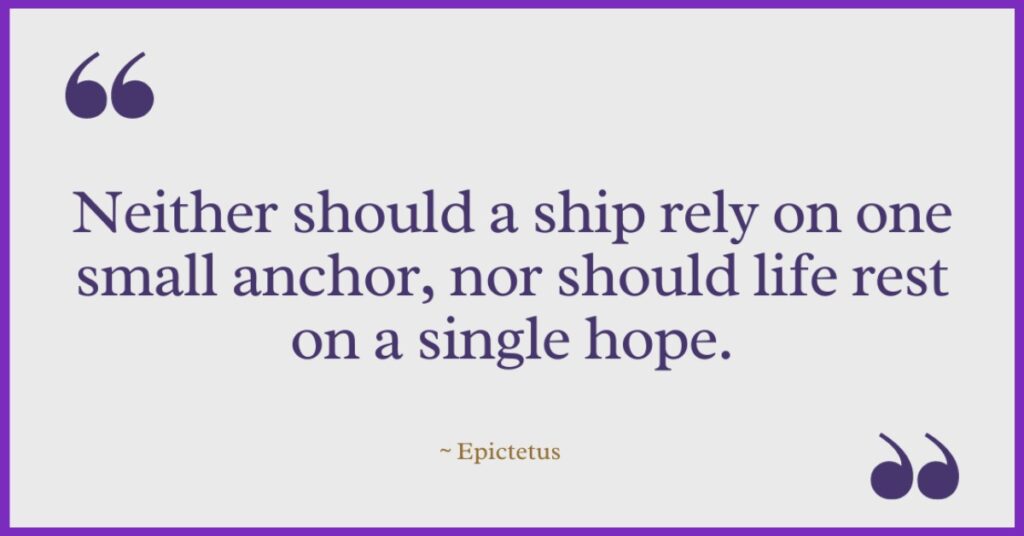
This vital understanding fosters a sense of empowerment; instead of engaging in futile worries over uncontrollable circumstances, we learn to cultivate inner peace through acceptance and virtue.
- “Neither should a ship rely on one small anchor, nor should life rest on a single hope.”
- “Give me by all means the shorter and nobler life, instead of one that is longer but of less account!”
- “Remember that you ought to behave in life as you would at a banquet. As something is being passed around it comes to you; stretch out your hand, take a portion of it politely. It passes on; do not detain it. Or it has not come to you yet; do not project your desire to meet it, but wait until it comes in front of you. ”
- “Your life is too short and you have important things to do. Be discriminating about what images and ideas you permit into your mind. If you yourself don’t choose what thoughts and images you expose yourself to, someone else will, and their motives may not be the highest.”
- “We should not moor a ship with one anchor, or our life with one hope.”
Epictetus Quotes on Control
His teachings guide us to focus our energy on our thoughts, actions, and responses rather than external circumstances that often elude our influence.

When we recognize that we cannot dictate the behaviors of others or alter random events, we alleviate much of the anxiety that comes from trying to manage the uncontrollable aspects of life.
- “Some things are in our control and others not. Things in our control are opinion, pursuit, desire, aversion, and, in a word, whatever are our own actions. Things not in our control are body, property, reputation, command, and, in one word, whatever are not our actions.”
- “Control thy passions lest they take vengence on thee.”
- “It is not he who reviles or strikes you who insults you, but your opinion that these things are insulting.”
Epictetus Quotes on Happiness
He offers profound insights into happiness, emphasizing that it is not a byproduct of external circumstances but rather a state rooted in our perceptions and choices.

The Stoic philosopher believed that happiness arises from within, contingent on our ability to manage our thoughts and reactions to life’s challenges.
- “There is only one way to happiness and that is to cease worrying about things which are beyond the power of our will.”
- “If virtue promises happiness, prosperity and peace, then progress in virtue is progress in each of these for to whatever point the perfection of
- anything brings us, progress is always an approach toward it.”
- “The essence of philosophy is that a man should so live that his happiness shall depend as little as possible on external things.”
- “Sick and yet happy, in peril and yet happy, dying and yet happy, in exile and happy, in disgrace and happy.”
- “If one oversteps the bounds of moderation, the greatest pleasures cease to please.”
- “He is a wise man who does not grieve for the things which he has not, but rejoices for those which he has.”
Epictetus Quotes on Success
True success is rooted in how we respond to life’s challenges, we cultivate a mindset that prioritizes personal growth and virtue over external validation.
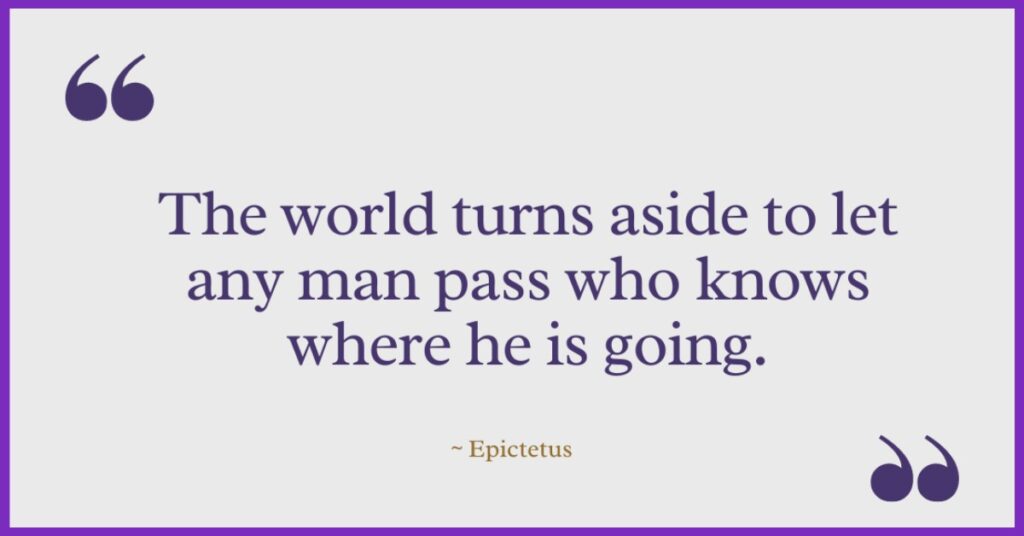
This perspective invites individuals to reassess their notions of achievement, leading them to recognize that the pursuit of wisdom and self-control can provide a more profound sense of fulfillment than any accolade.
- “The world turns aside to let any man pass who knows where he is going.”
- “Not every difficult and dangerous thing is suitable for training, but only that which is conducive to success in achieving the object of our effort.”
- “It’s time to stop being vague. If you wish to be an extraordinary person, if you wish to be wise, then you should explicitly identify the kind of person you aspire to become.”
- “The greater the difficulty, the more glory in surmounting it. Skillful pilots gain their reputation from storms and tempests.”
- “Practice yourself, for heaven’s sake in little things, and then proceed to greater.”
- “No great thing is created suddenly.”
- “One that desires to excel should endeavor in those things that are in themselves most excellent.”
- “If you want to improve, be content to be thought foolish and stupid.”
Epictetus’s Quotes on Freedom
He emphasizes that external circumstances often deceive us into believing we possess control over our lives, while in reality, freedom stems from within.

The philosopher asserts that while we cannot govern events or the actions of others, our responses and attitudes are entirely within our power.
This internal locus of control becomes the bedrock upon which genuine freedom is built one rooted in acceptance and self-mastery rather than entitlement to a specific outcome.
- “Freedom is the right to live as we wish.”
- “Freedom is not procured by a full enjoyment of what is desired, but by controlling the desire.”
- “Is freedom anything else than the right to live as we wish? Nothing else.”
- “Freedom is the only worthy goal in life. It is won by disregarding things that lie beyond our control.”
- “No man is free who is not master of himself.”
Epictetus Quotes on Death
Death is not an event to be dreaded, but a natural conclusion to life’s journey. Instead of viewing it as an end, he sees it as an inevitable transformation a reminder of life’s fleeting nature and the preciousness of each moment.

In his view death is beyond our control, we can liberate ourselves from the burdens of worry and focus on living virtuously in the present.
- “It is not death or pain that is to be dreaded, but the fear of pain or death.”
- “It is better to die of hunger having lived without grief and fear, than to live with a troubled spirit, amid abundance.”
- “Remind yourself that what you love is mortal … at the very moment you are taking joy in something, present yourself with the opposite impressions. What harm is it, just when you are kissing your little child, to say: Tomorrow you will die, or to your friend similarly: Tomorrow one of us will go away, and we shall not see one another any more.”
Epictetus Quotes on Self
His teachings encourage individuals to recognize that true control lies not in external circumstances but in how we respond to them.

This notion invites us to reflect on our thoughts and beliefs, encouraging growth through introspection.
- “Don’t explain your philosophy. Embody it.”
- “Know, first, who you are, and then adorn yourself accordingly.”
- “He who laughs at himself never runs out of things to laugh at.”
- “God has entrusted me with myself.”
- “I laugh at those who think they can damage me. They do not know who I am, they do not know what I think, they cannot even touch the things which are really mine and with which I live.”
- “You become what you give your attention to.”
- “The key is to keep company only with people who uplift you, whose presence calls forth your best.”
- “If you desire to be good, begin by believing that you are wicked.”
Epictetus Quotes on Circumstances
He argues that it’s not the events themselves that disturb us, but rather our judgments about them.

This insight encourages individuals to focus on their reactions and interpretations instead of external happenings, prompting a shift from victimhood to empowerment.
- “Circumstances don’t make the man, they only reveal him to himself.”
- “Difficulties are things that show a person what they are.”
- “Seek not the good in external things;seek it in yourselves.”
- “Don’t let the force of an impression when it first hits you knock you off your feet; just say to it, “Hold on a moment; let me see who you are and what you represent. Let me put you to the test.”
- “Getting distracted by trifles is the easiest thing in the world… Focus on your main duty.”
- “There is nothing good or evil save in the will.”
Epictetus Quotes on Wealth
He emphasizes that true wealth is not found in material possessions or financial success but rather in one’s character and mindset.
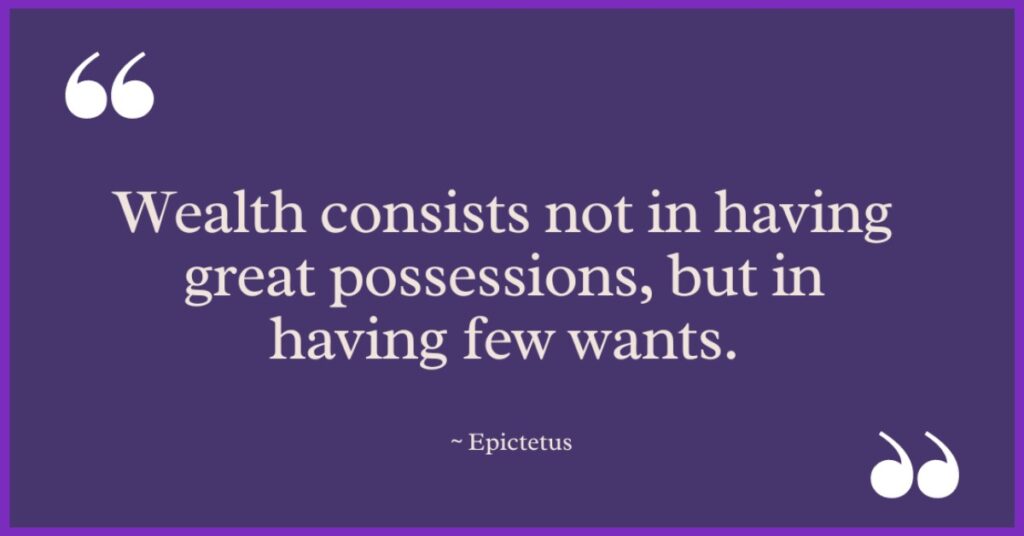
The essence of his philosophy suggests that external riches are transient and can easily be lost, whereas inner strength and virtue remain steadfast regardless of circumstances.
- “Wealth consists not in having great possessions, but in having few wants.”
- “Be careful to leave your sons well instructed rather than rich, for the hopes of the instructed are better than the wealth of the ignorant.”
- “Whoever does not regard what he has as most ample wealth, is unhappy, though he be master of the world.”
Epictetus Quotes on Education
Education is not just about learning facts but mastering oneself and understanding how to navigate life’s challenges with wisdom and resilience.

This perspective rethought our approach to learning; rather than simply aiming for academic success, we should focus on fostering qualities like patience, humility, and critical thinking.
- “Only the educated are free.”
- “It is impossible to begin to learn that which one thinks one already knows.”
- “To accuse others for one’s own misfortunes is a sign of want of education. To accuse oneself shows that one’s education has begun. To accuse neither oneself nor others shows that one’s education is complete.”
- “We are not to give credit to the many, who say that none ought to be educated but the free; but rather to the philosophers, who say that the well-educated alone are free.”
- “Don’t just say you have read books. Show that through them you have learned to think better, to be a more discriminating and reflective person. Books are the training weights of the mind. They are very helpful, but it would be a bad mistake to suppose that one has made progress simply by having internalized their contents.”
Epictetus Quotes on Character
His teachings suggest that true strength lies not in the situation we find ourselves in but in our responses to those situations.
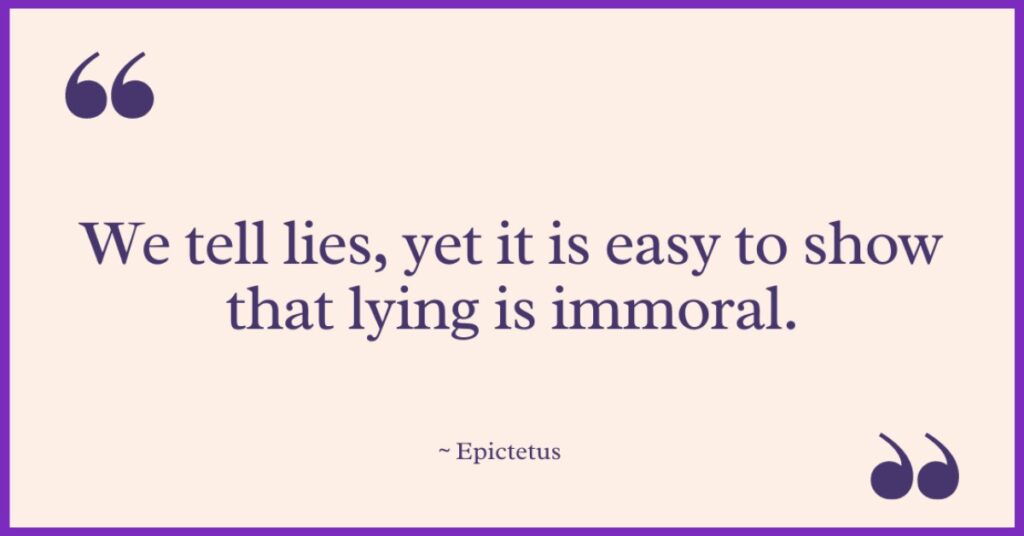
This perspective shifts away from blaming external factors for our misfortunes and instead focuses on cultivating virtues like patience, courage, and wisdom as the cornerstones of personal development.
- “We tell lies, yet it is easy to show that lying is immoral.”
- “Imagine for yourself a character, a model personality, whose example you determine to follow, in private as well as in public.”
- If you seek truth you will not seek victory by dishonorable means, and if you find truth you will become invincible.”
- “He is a drunkard who takes more than three glasses though he be not drunk.
- “Know you not that a good man does nothing for appearance sake, but for the sake of having done right?”
- “Small-minded people blame others. Average people blame themselves. The wise see all blame as foolishness.”
- “If thy brother wrongs thee, remember not so much his wrong-doing, but more than ever that he is thy brother.”
- “If anyone tells you that a certain person speaks ill of you, do not make excuses about what is said of you but answer, “He was ignorant of my other faults, else he would not have mentioned these alone.”
- “If evil be spoken of you and it be true, correct yourself, if it be a lie, laugh at it.”
Wisdom Epictetus’ Quotes
He has insights that resonate through the ages, encapsulating timeless wisdom in his quotes. His views emphasize the power of perception and mindset in shaping one’s experience of life.

- “It is the nature of the wise to resist pleasures, but the foolish to be a slave to them.”
- “All religions must be tolerated… for every man must get to heaven in his own way.”
- “You are a little soul carrying around a corpse.”
- “Do not seek to bring things to pass in accordance with your wishes, but wish for them as they are, and you will find them.”
- “Man is not worried by real problems so much as by his imagined anxieties about real problems.”
- “Do not try to seem wise to others.”
- “Events do not just happen, but arrive by appointment.”
- “Keep silence for the most part, and speak only when you must, and then briefly.”
- “Silence is safer than speech.”
Conclusion
The wisdom encapsulated in these 80 Epictetus quotes serves as a powerful reminder of the principles of Stoicism and the importance of self-control in navigating life’s challenges.
By embracing the teachings of Epictetus, we can cultivate a mindset that prioritizes inner freedom over external circumstances, allowing us to lead more intentional and fulfilling lives.
Each quote invites reflection on our perceptions and reactions, urging us to focus on what we can control while accepting what we cannot.
FAQs
What are the 4 Principles of Stoicism Epictetus Quotes?
The four principles of Stoicism: wisdom, justice, courage, and moderation serve as foundational virtues for leading a virtuous life.
What is Epictetus Famous for?
His ideas emphasized resilience in the face of adversity and living by nature, building upon the foundations laid by earlier thinkers like Heraclitus and Zeno of Citium.
What is the Theory of Epictetus?
He emphasizes the importance of understanding oneself and cultivating internal control over thoughts and emotions.

